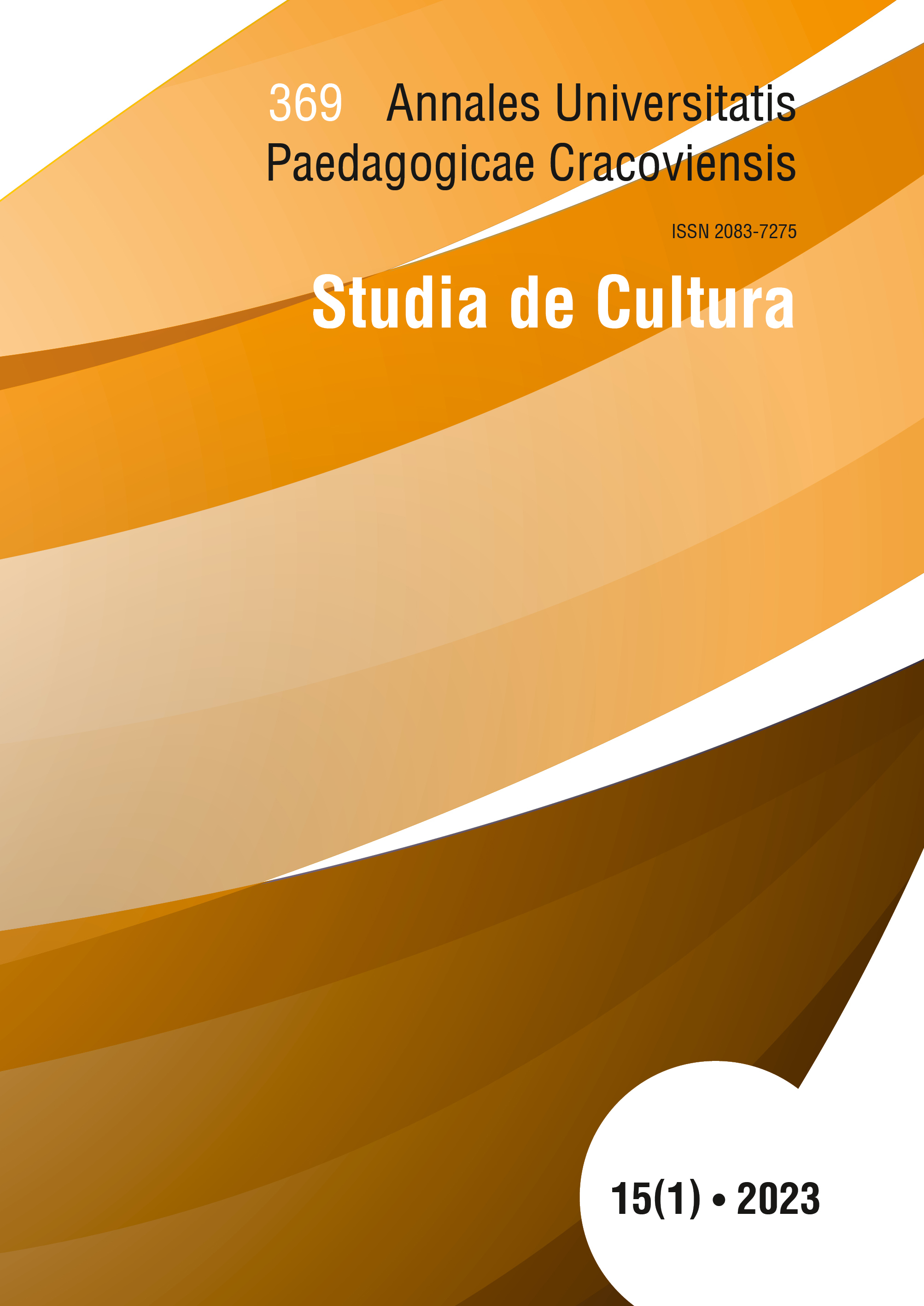Abstract
The article is an attempt to answer the question of how to write critical film narratives about films made by adolescents during professional workshops on animation. The author points out that such productions should be considered in two dimensions: the formal, including an analysis from an artistic point of view, and the educational, including a description of the production of a given work. Inspiring clues for answering the question concerning the content of such texts can be found in the works of Polish, English, and French researchers such as Bogusław Skowronek, Eliot Eisner, Cary Bazalgette, Ian Wall, and Alain Bergal, or in materials published on the platform Film Education: A User’s Guide. On the basis of the analysis of these texts, the author creates her own educational model, intended for people dealing with film education, containing particular stages for individual work in the classroom. The starting point for constructing the model was three films: Winda, Dziura, and Reflection, awarded at the 10th National Animation Festival O!PLA in the category Fine Arts Secondary Schools and Animation Workshops (15–19 years).
References
A Framework for Film Education. 2015. https://kreatywna-europa.eu/wp-content/uploads/2018/11/Film-education-1.pdf (access: 1.06.2022).
View in Google Scholar
Bazalgette Cary. 2007. Teachers & Media Professionals – An Equal Relationship?. https://filmeducationframework.eu/evaluation-and-impact/evaluating-projects (access: 26.06.2022).
View in Google Scholar
Bergala Alain. 2022. https://filmeducationframework.eu/choosing-watching-and-talking/the-pedagogy (access: 9.06.2022).
View in Google Scholar
Budzik Justyna- Hanna. 2017. “Film Education in Cinemas – Determinants and Tendencies.” Panoptikum 25(18). 157–178.
View in Google Scholar
Cabała Agata, Michalska Katarzyna. 2019. “Pedagogika z kultury. Klasy aktywności twórczej jako laboratorium doświadczeń kulturowych.” Kultura Współczesna 2(105). 161–175. doi.org/10.26112/kw.2019.105.13.
View in Google Scholar
Chambers Jamie. 2019. “Exploring co- creation in practical film education from primary school to postgraduate study: Theoretical and auto-ethnographic perspectives upon teaching film practice.” Film Education Journal 2(1). https://www.doi.org/10.18546/FEJ.02.1.03.
View in Google Scholar
Dwyer A. Thomas, Critchfield D. Margot. 1972. “Film as an Instrument for Evaluation.” Educational Technology 12(5). 40–43. http://www.jstor.org/stable/44417855 (access: 2.06.2022).
View in Google Scholar
Eisner Elliot W. 2002. The arts and the creation of mind. New Haven, CT.
View in Google Scholar
Federkiewicz Joanna. (2022). (Nie)samotni. Polskaanimacja.pl. https://polskaanimacja.wordpress.com/jak-pisac-oanimacji/ (access: 16.06.2022).
View in Google Scholar
Film Education: A User’s Guide. http://https://filmeducationframework.eu/evaluation-and-impact/evaluation-using-film (access: 1.06.2022).
View in Google Scholar
Fronczkowska Barbara. 2019. Alfabetyzm filmowy. Raport Narodowego Centrum Kultury Filmowej. Łódź. https://lodzcityoffilm.com/wp-content/uploads/2019/12/Alfabetyzm-filmowy.-Raport-NCKF-2.pdf (dostęp: 30.06.2023).
View in Google Scholar
Fudala Martyna. 2022. Piszę, co czuję. Polskaanimacja.pl. https://polskaanimacja.wordpress.com/jak-pisac-oanimacji/ (access: 16.06.2022).
View in Google Scholar
Grawon-Jaksik Alicja, Materska-Samek Marta. 2016. Czy kinematografia kręci się wokół dzieci? Kondycja kinematografii dla dzieci i analiza uwarunkowań edukacji filmowej dzieci do 12 roku życia. Raport. https://nck.pl/en/badania/raporty/raport-czy-kinematografia-kreci-sie-wokol-dzieci-kondycja-kinematografii-dla-dzieci-# (access: 1.06.2022).
View in Google Scholar
Harrison Henry L., Hummell Laura J. 2010. “Incorporating Animation Concepts and Principles in stem Education.” Technology Teacher 8(69). 20–25. https://search-1ebscohost-1com-1ognznvzq00e0.han.bg.us.edu.pl/login.aspx?direct=true&db=asn&AN=50253105&lang=en&site=eds- live (access: 19.06.2022).
View in Google Scholar
Jakubowska Małgorzata. 2017. Cele edukacji filmowej w Polsce: konteksty instytucjonalne i tendencje rozwojowe. In: Od edukacji filmowej do edukacji audiowizualnej. Ciszewska Ewa, Konrad Klejsa (ed.). Łódź. 99–117.
View in Google Scholar
Kaźmierczak Piotr. 2022. Interview with Piotr Kaźmierczak conducted by Piotr Kardas. (2021). https://www.youtube.com/watch?v=k2VNNKqDqo&list=PLl3X6fhShYk9KBxudbvTzu4-tzNvL1Kd-&index=12 (access: 16.06.2022).
View in Google Scholar
Kosińska Marta, Skórzyńska Agata, Szykowna Sylwia, Walczyk Jakub. 2019. “Wstęp.” Kultura Współczesna 2(105). 10.
View in Google Scholar
Legnicka Akademia Filmowa Warsztaty Filmu Animowanego. https://lck.art.pl/index.php?glowna=impreza_szczegoly&numero_imprezy=19 (access: 20.06.2022).
View in Google Scholar
Majewska Emilia. 2022. Niecodzienna codzienność. Polskaanimacja.pl. https://polskaanimacja.wordpress.com/jak-pisac-oanimacji (access: 16.06.2022).
View in Google Scholar
Mostowska Jadwiga. 2017. Praktyka edukacji filmowej w Polsce – uwarunkowania prawne i organizacyjne. In: Od edukacji filmowej do edukacji audiowizualnej. Ewa Ciszewska, Konrad Klejsa (eds.). Łódź. 131–143.
View in Google Scholar
Munro Robert, Charles Jonathan. 2021. “Exploring the place of animation and the role of the classroom- based filmmaker within a wider field of Scottish moving image education.” Film Educational Journal 4(1). https://doi.org/10.14324/FEJ.04.1.06.
View in Google Scholar
Raport: Edukacja filmowa w polskiej szkole na podstawie opinii nauczycieli uczestniczących w warsztatach „Filmoteki Szkolnej.” 2011. Warszawa. https://www.scdn.pl/images/stories/RAPORTY2011/16.pdf (access: 01.06.2022).
View in Google Scholar
Skowronek Bogusław. 2017. Edukacja filmowa (i medialna). Ujęcie antropologiczno- pragmatystyczne. In: Od edukacji filmowej do edukacji audiowizualnej. Ewa Ciszewska, Konrad Klejsa (eds.). Łódź. 11–21.
View in Google Scholar
Szoska Maria. 2019. Trudna obecność. Film w edukacji polonistycznej a interpretacja. Gdańsk.
View in Google Scholar
Szuksztul Filip. 2022. Time to try your best life + Winda + Spot „Teraz my!.” https://www.youtube.com/watch?v=hMR4qKn2kMo&list=PLl3X6fhShYk9KBxudbvTzu4-tzNvL1Kd-&index=7 (access: 1.06.2022).
View in Google Scholar
Wall Ian. 2008. Asking the Questions. http://www.thefilmspace.org/wp-content/uploads/2013/12/ASKING-THE-QUESTIONS.pdf (access: 10.06.2022).
View in Google Scholar
Wolny Eryka. 2022. G(o)łąb, reflection, słodziak. https://www.youtube.com/watch?v=04clcad9I3k&list=PLl3X6fhShYk9KBxudbvTzu4-tzNvL1Kd-&index=10 (access: 30.06.20230).
View in Google Scholar
YouTube channel: Halo Echo. https://www.youtube.com/channel/UCSLMoFSJlTr2DXXKeEQbegg/videos (access: 13.06.2022).
View in Google Scholar
YouTube channel: OKO KALEJDOSKOPU 2021 – nagrodzone filmy. 2021. https://www.youtube.com/watch?v=rpVpk0OWoCQ&list=PLjl47bYR_bTfUTEYYbBkcrA4m8N4cVHEn (access: 16.06.2022).
View in Google Scholar
YouTube channel: O!PLA na żywo, ale w domu. 2021. https://www.youtube.com/playlist?list=PLl3X6fhShYk9KBxudbvTzu4-tzNvL1Kd- (access: 16.06.2022).
View in Google Scholar
YouTube channel: Polska Animacja Festiwal O!PLA. 2022. https://www.youtube.com/watch?v=AM8LbeKhOrI&list=PLl3X6fhShYk9KBxudbvTzu4-tzNvL1Kd-&index=4 (access: 26.06.2022).
View in Google Scholar
YouTube channel: Punto y Raya JUNIOR. 2019. https://www.youtube.com/watch?v=tDOeuwikTWg&list=PLpimwMg5G5jxyEJzLkKBJfLzqYLpEUUx- (access: 26.06.2022).
View in Google Scholar
Żebrowski Mateusz. 2017. “Educational Potential of Animated Films in Poland.” Panoptikum 25(18). 106–120.
View in Google Scholar

This work is licensed under a Creative Commons Attribution-NonCommercial 4.0 International License.
Copyright (c) 2023 Annales Universitatis Paedagogicae Cracoviensis. Studia de Cultura

